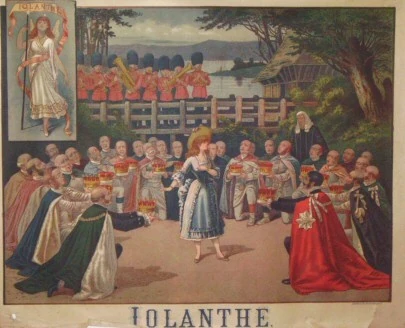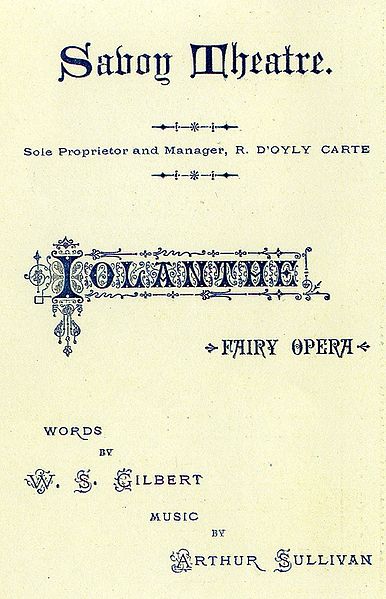Iolanthe Synopsis
Iolanthe History

Iolanthe or The Peer and the Peri is a comic opera with music by Arthur Sullivan and libretto by W. S. Gilbert. It is one of the Savoy operas and is the seventh collaboration of the fourteen between Gilbert and Sullivan.
Iolanthe was first produced in London at the Savoy Theatre, on 25 November 1882, three days after Patience closed, and ran for 398 performances. It was the first of Gilbert and Sullivan’s operas to premiere at the Savoy Theatre. The story concerns a band of immortal fairies who find themselves at odds with the House of Peers. The opera satirises many aspects of British government and law.
The opening night of Iolanthe was an occasion for what must have seemed a truly magical event in 1882. The Savoy Theatre was the first theatre in the world to be wired for electricity, and such stunning special effects as sparkling fairy wands were possible.
Gilbert had targeted the aristocracy for satirical treatment before, but in this “fairy opera”, the House of Lords is lampooned as a bastion of the ineffective, privileged and dim-witted. The political party system and other institutions also come in for a dose of satire. Among many potshots that Gilbert takes at lawyers in this opera, the Lord Chancellor sings that he will “work on a new and original plan” that the rule (which holds true in other professions, such as the military, the church and even the stage) that diligence, honesty, honour, and merit should lead to promotion “might apply to the bar”. Throughout Iolanthe, however, both author and composer managed to couch the criticism among such bouncy, amiable absurdities that it is all received as good humour. In fact, Gilbert later refused to allow quotes from the piece to be used as part of the campaign to diminish the powers of the House of Lords.
Although titled Iolanthe all along in Gilbert’s plot book for a time the piece was advertised as Perola. According to an often-repeated story, Gilbert and Sullivan did not change the name to Iolanthe until just before the première: “At the final rehearsal of Iolanthe at the Savoy, Sullivan addressed the assembled company: ‘Ladies and gentlemen. You have been rehearsing Perola but when the curtain goes up the opera will be called Iolanthe. Will you please change the name Perola to Iolanthe throughout. In fact, the title was advertised as Iolanthe as early as November 13, 1882 – eleven days before the opening – so the cast had at least that much time to learn the name. It is also clear that Sullivan’s musical setting was written to match the cadence of the word “Iolanthe,” and could only accommodate the word “Perola” by preceding it (awkwardly) with “O”, “Come” or “Ah”. The piece was subtitled The Peer and the Peri.
A glittering crowd attended the first night, including Captain (later Captain Sir) Eyre Massey Shaw, head of the Metropolitan Fire Brigade, whom the Fairy Queen apostrophises in the second act (“Oh, Captain Shaw/Type of true love kept under/Could thy brigade with cold cascade/Quench my great love, I wonder?”). On the first night, Alice Barnett as the Fairy Queen sang the verses directly to the Captain, to the great delight of the audience.
Source: Wikipedia
Iolanthe Synopsis
Act 1
 Twenty-five years prior to the beginning of the opera, Iolanthe, the mistress of fairy revels, who arranged all the fairy dances and songs, committed the capital crime (under fairy law) of marrying a mortal human. The Queen of the fairies commuted Iolanthe’s sentence of death to banishment for life on the condition that Iolanthe left her husband and never communicated with him again. After the passage of 25 years, the fairies, still missing Iolanthe deeply, plead with the Queen to pardon Iolanthe and to restore her place in fairyland.
Twenty-five years prior to the beginning of the opera, Iolanthe, the mistress of fairy revels, who arranged all the fairy dances and songs, committed the capital crime (under fairy law) of marrying a mortal human. The Queen of the fairies commuted Iolanthe’s sentence of death to banishment for life on the condition that Iolanthe left her husband and never communicated with him again. After the passage of 25 years, the fairies, still missing Iolanthe deeply, plead with the Queen to pardon Iolanthe and to restore her place in fairyland.
Summoned by the Fairy Queen, Iolanthe rises from the frog-infested stream that has been her home in exile. The Queen, unable to bear punishing her any longer, pardons Iolanthe, and she is warmly greeted by the other fairies. Iolanthe tells her sisters that she has a son, a half-fairy, half-human named Strephon (“He’s a fairy down to the waist, but his legs are mortal”). The fairies laugh that Iolanthe appears too young to have a grown son, as one of the advantages of a fairy’s immortality is that they never grow old. Strephon, a handsome Arcadian shepherd, arrives and meets his aunts. He tells Iolanthe joyously of his love for the Lord Chancellor’s ward of court, the beautiful Phyllis. Phyllis does not know of Strephon’s mixed origin. Strephon is despondent, however, as the Lord Chancellor has forbidden them to marry – partly because he feels that a shepherd is unsuitable for Phyllis, but partly because he wishes to marry Phyllis himself. In fact, so do half the members of the House of Lords. The Fairy Queen promises her assistance. Soon Phyllis arrives, and she and Strephon share a moment of tenderness as they plan their future and possible elopement.
A cadre of the peers of the realm arrive. They are all smitten with Phyllis, and they have appealed to the Lord Chancellor to decide who will have her hand. The Lord Chancellor is hesitant to act upon his own regard for Phyllis passion due to his position as her guardian. The Lords send for Phyllis to choose one of their number, but she declares that she won’t marry any of them, as virtue is found only in a “lowly” cottage. The peers are unhappy at her rejection and beg her not to scorn them simply because their blood is excessively blue. Strephon approaches the Lord Chancellor, pleading that Nature bids him marry Phyllis. But the Lord Chancellor wryly notes that Strephon has not presented sufficient evidence that Nature has interested herself in the matter. He refuses his consent to the marriage between Strephon and Phyllis.
Disappointed, Strephon calls on Iolanthe for help. She appears and promises to support him in every way. Spying on the two, the peers — led by the brainless and stuffy Earls Tolloller and Mountararat — together with Phyllis, see Iolanthe and Strephon in a warm embrace. All three jump to the obvious conclusion, since the centuries-old Iolanthe appears to be a girl of seventeen. The peers scoff at the seemingly absurd claim that Iolanthe is Strephon’s mother (“She is, has been, my mother from my birth”). Phyllis angrily rejects Strephon for his supposed infidelity and declares that she will marry either Lord Tolloller or Lord Mountararat (“…and I don’t care which!”). Strephon at last calls for help from the fairies. They appear on cue, but are mistaken by the peers for a girls’ school on an outing. Offended, the Fairy Queen pronounces a magical “sentence” upon the peers: Strephon shall not only become a Member of Parliament, but will have the power to pass any bill he proposes, including throwing the peerage open to competitive examination. The curtain closes with the fairies threatening the peers.
Act 2
The fairies have come to Westminster and tease the unhappy peers with the success and pronouncements of MP Strephon. As the Fairy Queen threatened in Act I, Strephon is advancing a bill to open the peerage to competitive examination. The peers ask the fairies to stop Strephon’s mischief, stating that the House of Peers is not susceptible of any improvement. Although the fairies say that they cannot stop Strephon, they have become very much attracted to the peers, whom they find handsome and delightful. The fairy Queen is dismayed by this. Pointing to Private Willis of the First Grenadier Guards, who is the sentry on duty, the Queen claims that she is able to subdue her response to the effects of manly beauty.
Phyllis cannot decide which of the two selected peers, Tolloller or Mountararat, she ought to marry, and so she leaves the choice up to them. However, Tolloller tells Mountararat that his family’s tradition would require the two Earls to duel to the death if the latter were to claim Phyllis. The two decide that their friendship is more important than love, and renounce their claims to her. Meanwhile, the Lord Chancellor has a nightmare due to his unrequited love for Phyllis. The two peers try to cheer him up. At their urging, the Lord Chancellor determines to make another effort to convince himself to award Phyllis to himself.
Although Strephon now leads both parties in Parliament, he is miserable at losing Phyllis. Seeing Phyllis, he finally explains to her that his mother is a fairy, which accounts for a good many things! Phyllis and Strephon ask Iolanthe to go to the Lord Chancellor and plead for him to allow their marriage, for “none can resist your fairy eloquence.” Impossible, she replies, for the Lord Chancellor is her husband. The Lord Chancellor believes Iolanthe to have died childless, and she is bound not to “undeceive” him, under penalty of death. However, to save Strephon from losing his love, Iolanthe decides to present his case to the Lord Chancellor in disguise.
Although the Lord Chancellor is visibly moved by her appeal, which evokes the memory of his lost wife, he declares that he himself will marry Phyllis. Dismayed, Iolanthe desperately unveils, despite the warnings of the unseen Fairies, revealing that she is his long-lost wife, and that Strephon is his son. The Lord Chancellor is amazed to see her alive, but Iolanthe has again broken fairy law, and the Fairy Queen is now left with no choice but to punish Iolanthe with death. As she prepares to execute Iolanthe, the Queen learns that the rest of the fairies have all now chosen husbands from among the peers, thus also incurring death sentences — but the Queen blanches at the prospect of slaughtering the whole company of fairies. The Lord Chancellor suggests a solution: change the law by inserting a single word: every fairy who “doesn’t” marry a mortal shall die. The Fairy Queen cheerfully agrees and, to save her life, the dutiful soldier, Private Willis, agrees to marry her. Likewise, seeing no reason to stay in the mortal realm if peers are to be recruited from persons of intelligence, the peers agree to join the fairy ranks. They all sprout wings, and “away they go to fairyland.”
Source: Wikipedia
